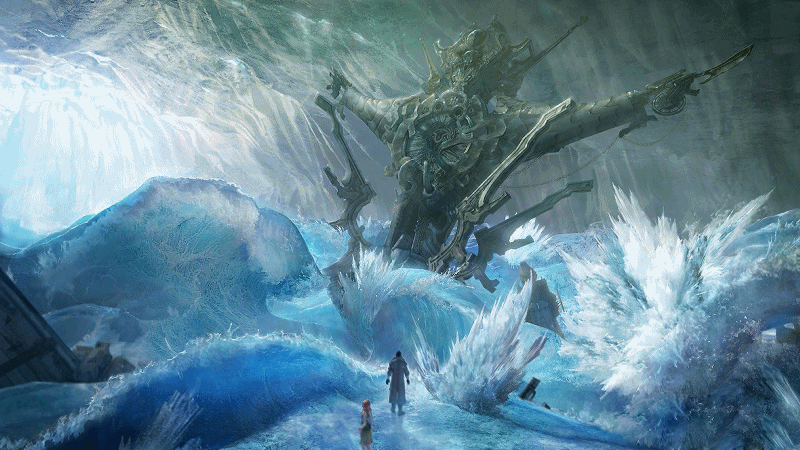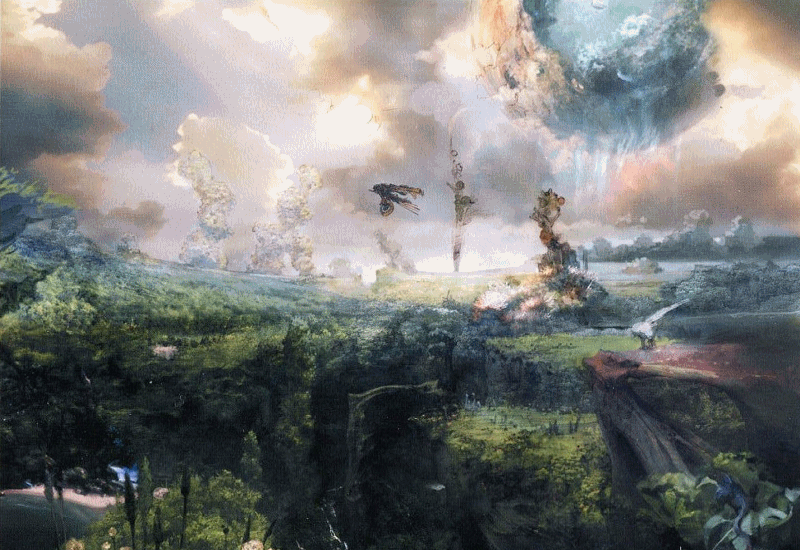This is going to be a little rambly. I only wanted to pick up a quote from episode 5 of True Detective because it repeats a pattern. One that I’ve been using in many of my posts on “mythology”.
This is a world where nothing is solved.
Someone once told me, “Time is a flat circle.”
Everything we’ve ever done or will do
we’re gonna do over and over and over again…
…and that little boy and that little girl,
they’re gonna be in that room again…
and again…
and again…
forever.You ever heard of something called
the M-brane theory, detectives?
It’s like in this universe,
we process time linearly forward…
but outside of our spacetime,
from what would be a fourth-dimensional perspective,
time wouldn’t exist,
and from that vantage, could we attain it..
we’d see…
our spacetime would look flattened,
like a single sculpture with matter
in a superposition of every place it ever occupied,
our sentience just cycling through our lives
like carts on a track.
See, everything outside our dimension…
that’s eternity,
eternity looking down on us.
Now, to us,
it’s a sphere,
but to them…
it’s a circle.In eternity, where there is no time,
nothing can grow.
Nothing can become.
Nothing changes.
So death created time
to grow the things that it would kill…
and you are reborn
but into the same life
that you’ve always been born into.
I mean, how many times have we
had this conversation, detectives?
Well, who knows?
When you can’t remember your lives,
you can’t change your lives,
and that is the terrible and the secret fate of all life.
You’re trapped…
by that nightmare you keep waking up into.
The theme of circularity is less clear, but the rest is again about determinism and the loophole. The second block speaks of the fourth-dimensional perspective, but the important aspect is the shift from one perspective to the other. One, ours, is a perspective from within the sandbox, the other, belonging to a theoretical observer we can as well call “God”, is the perspective from outside the sandbox. Where “the sandbox” means the known universe.
What’s important about this sandbox is that all its laws are contained and the sandbox is sealed. The premise of determinism is that there isn’t any intervention to the inside of this sandbox from the outside. This is also the premise of “science”, or the belief that the laws that rule the world are not mutable (if not when subject to bigger rules).
From that perspective, from the outside, everything is cause and effect. If we toss a coin we might interpret the outcome as “random”, but we also know that the face the coin falls on depends on a great number of factors and laws. Ideally, if we could know every factor we could also then predict the trajectory of the coin, how many times it spun in the air, and so predict the face it would fall on. But since this complexity is already far beyond our reach, we still consider it a practical use of randomness: we just don’t have that kind of control when we toss the coin.
But we can imagine a different perspective if one looks from the outside. In this case it would be like a sequence of numbers, of the kind where you have to guess a few missing ones by looking and figuring out the relationship between the numbers that are there. This is a common game. But with the perspective from the outside the game is different: you know already the rule that generates the sequence of numbers, you are given one number at a random point of the sequence, and your job is instead to deduce all the numbers that come before, and all the numbers that come after. That’s determinism.
Within this context, looking from the outside, the life of someone within this box looks like “trapped”. Why trapped?
“if you can’t remember your lives, you can’t change your lives”
If a choice depends, is influenced, by processes that “come before”, then that choice is always the same if the factors leading to it do not change either. But if you have memories, then these different factors will produce different results. Within a single life, linearly, you can see how experiences influence different choices down the line. That’s a perspective from within the box.
The “loophole” is again theoretically personified as “God”. Or: you need a way to escape the sealed sandbox, a kind of loophole that lets you go “take a glimpse” from the outside, and then returning back in, keeping that knowledge, so that you can use it to “change” what happens within the sandbox.
That’s once again the idea playing in those quotes. If “God” granted us, whenever the timeline reboots and we are reborn, “memories” of our past lives, then it would be as if we would obtain the “breaching of the vessel” that grants us the loophole. Knowledge that passes through God, holding our previous memories, is knowledge that is taken from the sandbox, preserved outside it, and then injected in the box to alter its content: this is intervention from the outside, and so the sandbox isn’t sealed anymore (unless there’s another external observer, whose observed system would be a deterministic “sandbox + observed god”).
Why does this matter?
If it’s all a game of infinite perspective shifts, then we are all alike God, playing with sub-creations (see Tolkien on his mythology).
How many times those detectives had their conversation, indeed? I’ve played it at least twice. And it was repeated as many times that show was seen. Every time it’s the exact same conversation. Because those characters are trapped in a movie, and the movie plays always the same. Those characters can show feelings and everything, but they don’t have memories of the repeating acts. You can see “choice” happen, when you move from one episode to the next, those characters react depending on their past experiences, but if you rewatch the show they aren’t going to retain those memories, and so they can only repeat themselves in the exact same way.
(interesting how the genre of games called “roguelike” offers a good example of loophole and sandbox-violation. The sandbox is the game, the player is the god. The character in the game/sandbox can die permanently, but then his “knowledge”/memories passes to the player, who’s going to learn from those characters’ deaths, and play better)
So if god created the world, and sees it as a deterministic system where we don’t have any freedom, the same happens to us and to our sub-creations. We are small gods with small powers, just repeating the same moves in a smaller scale. I guess.

 Oh, True Detective, HBO. Singular masterpiece on TV now.
Oh, True Detective, HBO. Singular masterpiece on TV now. Final Fantasy 13 is still widely considered the worst in the whole series, and rightly so to an extent. It’s pretty clunky and bad as a “game”, but I still do believe that its setting and mythology are rather interesting and the better developed compared to all the other games in the series.
Final Fantasy 13 is still widely considered the worst in the whole series, and rightly so to an extent. It’s pretty clunky and bad as a “game”, but I still do believe that its setting and mythology are rather interesting and the better developed compared to all the other games in the series.
